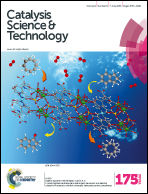Chemoselective transfer hydrogenation of α,β-unsaturated carbonyl compounds using potassium formate over amine-grafted Ru/AlO(OH) catalysts†
Abstract
Grafting of 3-(2-aminoethylamino)propyltrimethoxysilane onto Ru/AlO(OH) resulted in an active and highly chemoselective heterogeneous catalyst for the transfer hydrogenation of α,β-unsaturated carbonyl compounds to the corresponding allylic alcohols. Potassium formate was used as a sustainable hydrogen donor. A range of substrates including cinnamaldehyde, α-amylcinnamaldehyde, citral, 3-methyl-2-butenal, trans-2-pentenal, and trans-hexenal were selectively hydrogenated at the C![[double bond, length as m-dash]](https://www.rsc.org/images/entities/char_e001.gif) O moiety with >96% selectivity. In comparison, the unmodified 1 wt% Ru/AlO(OH) catalyzed hydrogenation of cinnamaldehyde at the C
O moiety with >96% selectivity. In comparison, the unmodified 1 wt% Ru/AlO(OH) catalyzed hydrogenation of cinnamaldehyde at the C![[double bond, length as m-dash]](https://www.rsc.org/images/entities/char_e001.gif) C bond, yielding 3-phenylpropanal as the product. Higher loaded samples with 2–10 wt% Ru exhibited 20–25% selectivity to cinnamyl alcohol. The results show that low coordination sites were more selective to hydrogenation of the internal C
C bond, yielding 3-phenylpropanal as the product. Higher loaded samples with 2–10 wt% Ru exhibited 20–25% selectivity to cinnamyl alcohol. The results show that low coordination sites were more selective to hydrogenation of the internal C![[double bond, length as m-dash]](https://www.rsc.org/images/entities/char_e001.gif) C than the terminal C
C than the terminal C![[double bond, length as m-dash]](https://www.rsc.org/images/entities/char_e001.gif) O bond. Immobilization of the amine via chemical bonding with hydroxyl groups of the AlO(OH) support blocks adjacent exposed metal sites, increasing the chemoselective reduction of C
O bond. Immobilization of the amine via chemical bonding with hydroxyl groups of the AlO(OH) support blocks adjacent exposed metal sites, increasing the chemoselective reduction of C![[double bond, length as m-dash]](https://www.rsc.org/images/entities/char_e001.gif) O. Optimum results were achieved at an amine/Ru ratio of 6. The catalyst maintained high activity and chemoselectivity even after five cycles.
O. Optimum results were achieved at an amine/Ru ratio of 6. The catalyst maintained high activity and chemoselectivity even after five cycles.


 Please wait while we load your content...
Please wait while we load your content...